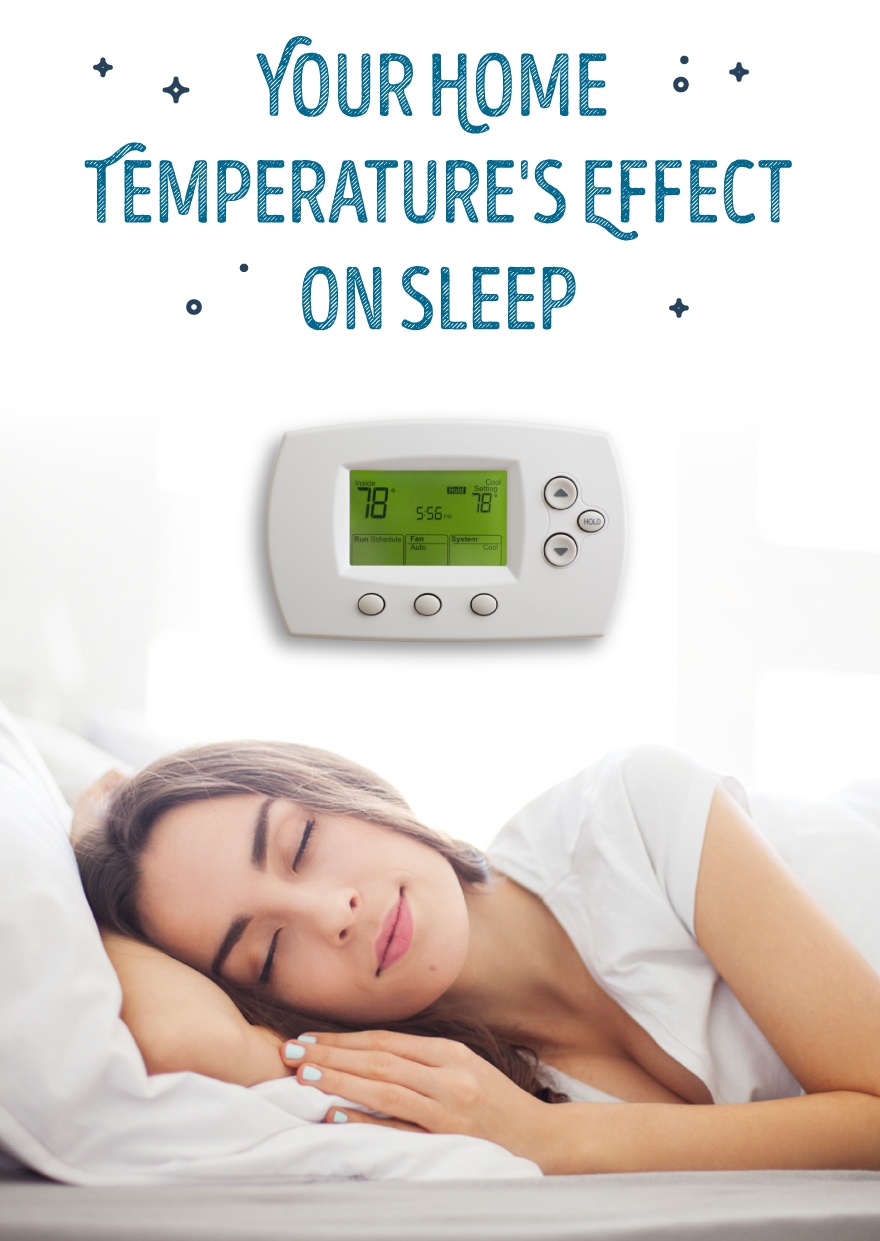
More than one in three Americans suffer from sleep deprivation, according to the Centers for Disease Control and Prevention. If you're among the more than 30 percent of individuals who aren't getting the optimal amount of shut-eye you need each night, it could affect your health. In fact, the Sleep Research Society and American Academy of Sleep Medicine recommend a minimum of seven hours of sleep each night for adults between the ages of 18 and 60 years old to promote good health and well-being.
While there are numerous reasons you're not getting the seven to nine hours each night of continuous sleep experts recommend, one common reason is setting your bedroom thermostat too high.
Maybe you’re trying to save money by raising your thermostat in the summertime, but you might be impacting other aspects of your life by doing so. That’s because the temperature in your environment has a lot to do with how you sleep. For many individuals, just like having the right mattress firmness and favorite pillow, the temperature in their bedroom has to be just right for them to get a good night’s sleep.
Consequences of Sleep Deprivation
The Harvard Medical School and others warn about the short and long-term effects of sleep deprivation. A lack of sleep can lead to several health and lifestyle consequences, including:
-
Weight gain leading to obesity
-
Higher risk of heart disease
-
Mood changes
-
Altered ability to make sound judgments
-
Higher risk of diabetes
-
Difficulties to learning and retaining information
-
Weakened immune system
-
Mistakes at work
-
Motor vehicle accidents as a result of drowsy driving
-
Higher risk of mortality

Nobody is entirely free from sleep disorder risk. Even an otherwise healthy adult can still experience trouble sleeping for several days or develop short-term insomnia. And often, it's because of an uncomfortable sleeping environment and the temperature's effect on sleep.
Home Temperature and Sleep
While escaping the heat during the day might be an easy fix by going swimming, visiting the beach or jumping through the sprinklers in the backyard with your children, it's often harder to get away from the heat at night when you're cooped up in a hot bedroom trying to sleep.
Your body has an internal thermostat — and if the external temperature is too hot or too cold, your body struggles to attain this set point.
Your internal clock — Your body’s internal clock, also known as circadian rhythm, regulates many of your body functions, including your:
-
Blood pressure
-
Heart rate
-
Body temperature
-
Hormone release
These all act together, helping you sleep at night and stay awake in the daytime. Your body temperature slightly rises and falls during a regular day. It's all tied to your sleep cycle. Studies have shown some types of insomnia link to improper body temperature regulation.

When you start getting drowsy, your body temperature falls and is at its lowest at approximately 5 a.m., reports the National Sleep Foundation, an organization committed to improving well-being and health through sleep advocacy and education.
This slight drop in your body temperature induces sleep. According to researchers, when your body temperature falls, it’s to conserve energy for other body functions you usually spend sustaining normal body temperature. Then, in the morning, your body temperature begins climbing slightly.
Your bedroom temperature and sleep — Your home’s temperature and sleep go hand-in-hand. The temperature in your bedroom affects your comfort level, and this particularly affects your REM, or rapid eye movement, sleep quality. REM is the stage of sleep where you dream, and is an important stage in getting restful, deep sleep.
The bedroom air can impact your sleep — when it's too hot, it can interrupt your body's natural dip, making you toss and turn throughout the night feeling restless. If you're in a cooler room, it’s easier to fall asleep. However, if your bedroom becomes too hot and uncomfortable, you're more likely to wake up.
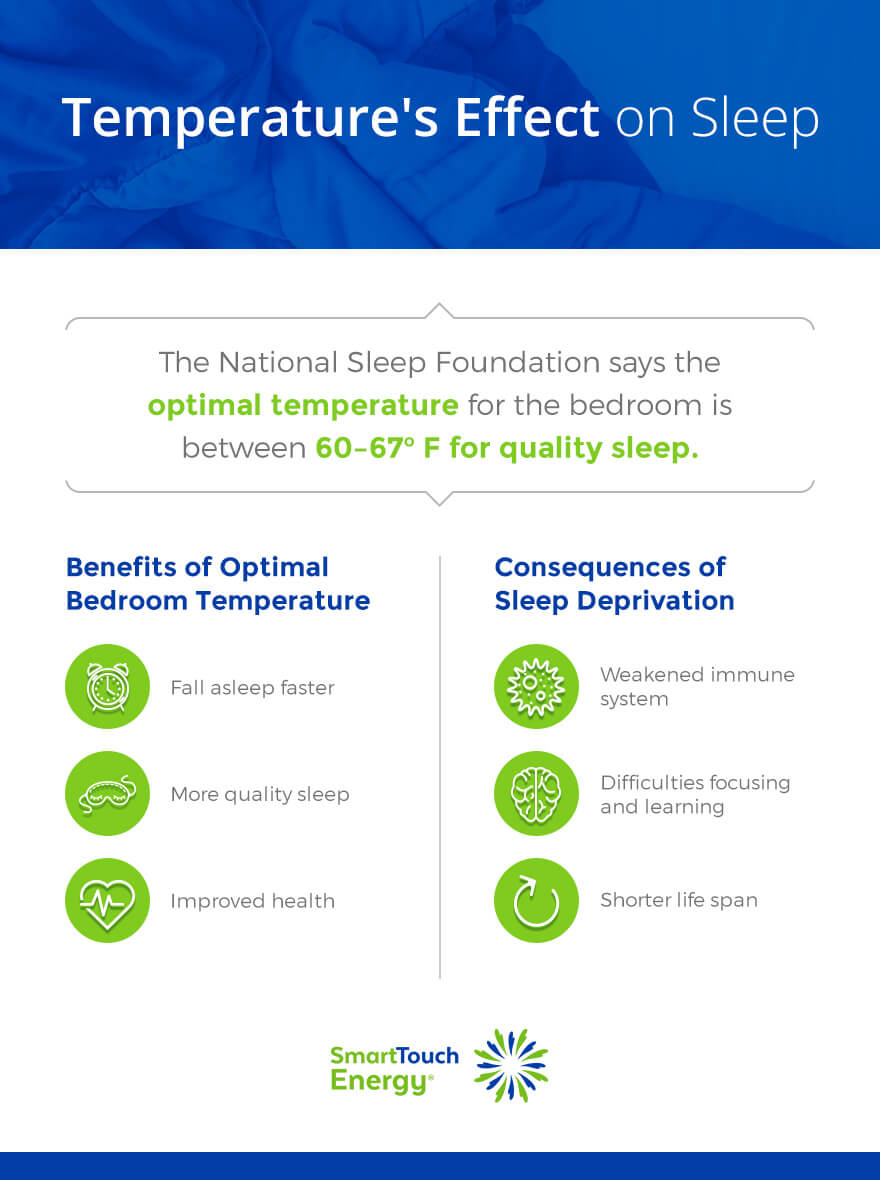
This work is licensed under a Creative Commons Attribution-NoDerivs 3.0 United States License. If you like our infographic, feel free to share it on your site as long as you include a link back to this post to credit Smart Touch Energy as the original creator of the graphic.
What is the ideal bedroom temperature? The National Sleep Foundation says the optimal temperature for the bedroom is between 60 and 67 degrees Fahrenheit for quality sleep. When your body temperature begins falling to induce sleep, having the room temperature in this range can help speed up the process.
Benefits of Sleeping in a Cool Bedroom
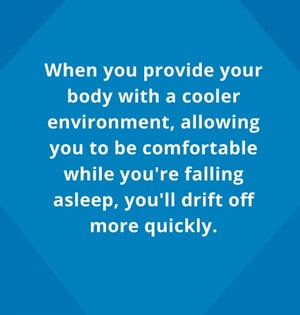 For numerous reasons, sleeping in a cooler bedroom can benefit you, including the following.
For numerous reasons, sleeping in a cooler bedroom can benefit you, including the following.
- You can fall asleep faster. When you provide your body with a cooler environment, allowing you to be comfortable while you're falling asleep, you'll drift off more quickly. When it’s too hot, your body is wasting energy attempting to regulate itself, leaving you restless all night.
- You can get more quality sleep. You'll fall into a more restorative, deeper sleep when your body isn't attempting to regulate itself. In anticipation of sleep, your body cools itself off. If your body runs hot automatically, though, you'll need to adjust the bedroom to a cooler temperature to let your body know it's time for bed.
- You can help to prevent insomnia. An overactive brain or stressful days aren’t the only things that keep you lying awake at night. Research has shown sleeping in a cooler environment helps decrease some types of insomnia. Individuals plagued with insomnia often have warmer core body temperatures before they fall asleep, compared to "normal" individuals.
- You can potentially improve your health. As mentioned at the top of this article, sleep deprivation can lead to a host of negative health effects, including increasing the risk of developing obesity, diabetes and cardiovascular disease.
How to Maintain an Optimal Home and Bedroom Temperature for a Better Night's Sleep
While excessive heat during your day can make you feel fatigued and tired, it can also make it harder for you to go to sleep at night. Knowing this now, you should learn some ways to keep your bedroom at an optimal temperature so you can sleep better at night.
While cranking up the AC sounds like the most logical solution, if you're trying to conserve energy and reduce your cooling bill, other things you can try include the following.
Ensure Proper Thermostat Settings
Ideally, for the best sleep, turn your thermostat down to between 60 and 67 degrees Fahrenheit, as mentioned. Because everyone's preferred temperature varies, it's necessary to figure out the most comfortable temperature for you. Remember, a cooler bedroom should help speed up the drop in your body temperature and facilitate faster sleep.
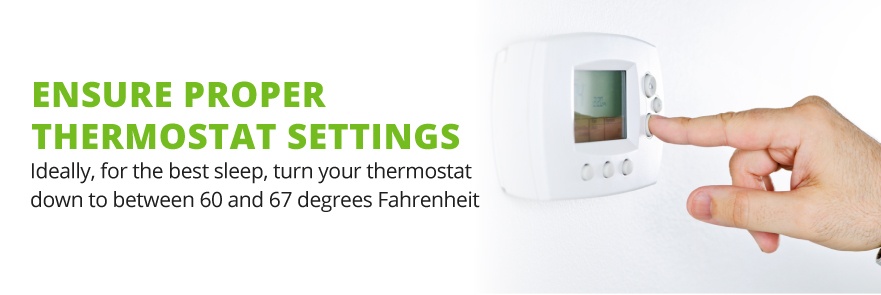
Now, if you’re trying to put your toddler or baby down to sleep, it's fine to raise the thermostat a little higher — somewhere between 65 and 70 degrees. However, you’ll want to ensure the temperature stays consistent.
Check Your Thermostat’s Calibration
Checking your thermostat's calibration is simple and something you should do annually, usually in the fall. Just tape an accurate thermometer next to your thermostat and read the temperature on both devices around 15 minutes later.
A variance of +/- 3 degrees Fahrenheit is usually fine, but anything that's outside this range could mean your thermostat might require servicing. If you're not sure how to calibrate a thermostat, contact us here at Smart Touch Energy to come in and do it for you.
 Clean Your Thermostat
Clean Your Thermostat
The mechanical contacts of a thermostat need periodic cleaning to maintain accuracy. A clean thermostat helps ensure you stay cool this summer, and warm in the winter.
You can do this maintenance task yourself, or you can ask us here at Smart Touch Energy to clean your thermostat when we’re in for an air conditioning tune-up. You'll need to remove the cover of the thermostat carefully and brush away any dirt or dust you see with a Q-Tip or soft cloth. If there's any surface corrosion, use an electrical contact cleaner to remove it. Hardware stores carry this cleaner.
Adjust Your Thermostat
If your thermostat is problematic even after you had it calibrated and cleaned, you can try other adjustments that could help, including the following.
-
Check the level. Some older thermostats have a small mercury vial that needs to be level to maintain the right temperature control. A standard carpenter's level can confirm this. If the measure is off, adjust the thermostat placement until it's straight. And, if you do have an old-school thermostat with mercury, consider replacing it with a digital, programmable or smart thermostat.
-
Move the heat anticipator. If you notice your furnace cycling on and off too often, you'll want to adjust the heat anticipator. Check for a small lever underneath a scale that has an arrow on it marked "longer." You'll increase your HVAC system's length of cycling time. Keep in mind, however, longer cycle times are not as effective at maintaining the desired temperature of your home.
-
Adjust the calibration screw. You can adjust screw-type thermostats for accuracy using the small screw you'll find on the unit inside the coil. Be sure to check your manual first, since there are different calibration methods for different products.
If you continue to have thermostat issues or would rather not perform these adjustments yourself, contact a trained HVAC expert at Smart Touch Energy for assistance. Don't ignore a thermostat problem for too long, since an efficiently working thermostat will ensure a more economical and reliable HVAC system.
Invest in a Smart Thermostat
Smart thermostats are Wi-Fi-enabled devices that adjust cooling temperature settings automatically in your home to ensure optimal performance. Some modern thermostats have sensors you can place in various rooms — like your bedroom — to allow you to control that room’s temperature at set times of the day and night.

Get Your Furnace Inspected
Regular inspections will prolong your furnace's lifespan. If you don't schedule a yearly inspection for your furnace, you risk having it break down. During the inspection, the skilled technician might find small problems that could lead to a major repair if you fail to correct them.
Preventive furnace maintenance ensures all parts of your furnace function correctly and works together. Fall is an excellent time to schedule your yearly furnace inspection.
Tune up and Maintain Your Air Conditioning Units
Your air conditioning system requires regular maintenance for it to run effectively and efficiently. Enlisting Smart Touch Energy to perform an AC tune-up service twice a year can reduce your risk of an expensive breakdown and save you money.
Air conditioning systems are typically in heavy use during the months of summer, then go unused for several months during the winter. Without regular maintenance, the wear and tear on your AC unit can lead to a decreased lifespan. Since your AC system is an essential component of your home, you shouldn't neglect its regular maintenance.
Ideally, you should get your AC system tuned up before the start of the hot summer months, and again before you turn your heater on for the winter. By doing this, you ensure your system is functioning properly, and prevent any uncomfortable surprises when trying to cool your home in the summer.
Repair Any Air Conditioning Problems
Many individuals mistakenly put off proper AC repairs. Although some repairs might seem minor, they can turn into major problems quickly. If something should happen to your AC unit during the hot summer months, you could end up having to endure the extreme heat for a few days without the relief of your system. To ensure your air conditioning system continues keeping your family cool throughout the summer, the best thing you can do is to get the necessary AC repairs done quickly.
Don't attempt to do the AC repair work yourself. It's better to hire a qualified and trained AC contractor. If you try and do the repairs yourself, you could end up with even further complications, which can result in higher costs because of the damage you caused.
Also, don't just call anyone to come and do the job. Find a reliable company to do the air conditioning repair. The company you choose should have an outstanding reputation and should be licensed to work in your state.
While AC systems are typically reliable and made to last many years, they still require occasional repairs and regular maintenance.
Use Windows and Fans to Your Advantage
Some things you can do include:
Block out the sunlight. You can control your bedroom temperature in the hot weather by closing the curtains to keep the sun out during the brightest part of the day and open your curtains back up during the cooler evening hours to allow built-up heat to dissipate. Insulated or blackout curtains are ideal for keeping your bedroom cool and dark in the summer.

While most window treatments can help reduce how much a room heats up, some work better than others. Typically, shades or curtains with a white backing work better. Also, cellular shades are good at insulating the bedroom, keeping solar heat from getting in and preventing warm air from escaping during the winter.
According to the U.S. Department of Energy, properly installed cellular shades help block out almost 80 percent of solar heat. Curtains will work as well, but remember, they need to have the white backing.
Use fans. Fans aren't necessarily "cooling" the air, but rather, they're keeping the air moving around. When the air hits your skin and evaporates your sweat, this is where you feel cooler than if the air was still.
There's a lot of skepticism around how effective window-mounted and standing fans are. Many naysayers claim they only move hot air around. While this is true in a way, strategically positioning your fans can help. For instance, if you place a bowl of ice at the back of a fan, as the ice starts melting, the breeze from the fan will distribute the water vapor, providing you with cool air. Or, if you position a window fan to face outward, and set it on exhaust, it will suck the hot air right out of your hot bedroom.
As the temperatures outdoors drop overnight, cooler air will replace the displaced warm air. By leaving a second window open, you'll create a cross-breeze, which will increase this method's effectiveness and provide good cross-ventilation.
Pay attention to proper fan logistics. Ceiling fans work wonders in the hot summertime. To make the most of their abilities, ensure they rotate counter-clockwise during the summer, which provides for maximum downdraft. Leave them on in the daytime to help expedite the evening cool-down process. In the winter, switch your ceiling fans to clockwise circulation.
Let in the nighttime air. In the summertime, the temperatures will still drop a little in the evening and overnight. Take advantage of these refreshing hours before you go to bed by cracking the windows. As mentioned above, set up your fans strategically to create a wind tunnel and a pleasant cross-breeze. Remember to close the windows and shades come morning to keep the heat out.
Use your windows strategically. Open the top part of your windows on your home's downwind side to create a cooling pressure. Also, on the upwind side, open the bottom part of your windows. Face a box fan out one of the windows to push out the hot air. You can also dampen a sheet and hang it in front of the other open window to create a chill-infused breeze.
Ditch the Electronics
You've probably noticed when you touch an electronic that's been on for a while, it's hot. Leaving your electronics on when you're not using them creates heat, so unplug them. Not only that, but the blue light these devices emit can impact your sleep quality adversely because they “trick” your brain into believing it’s daytime, which alters your circadian rhythm.
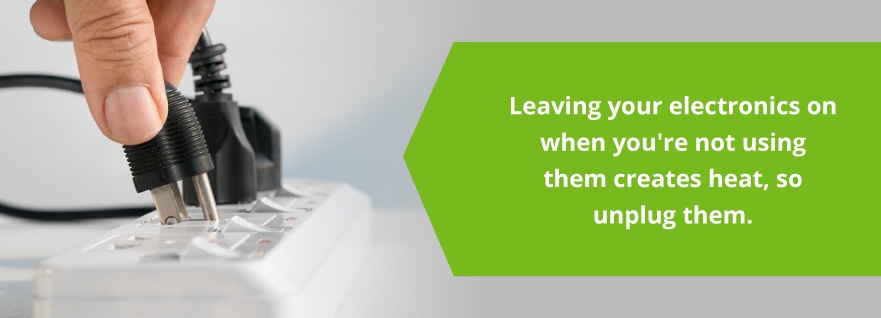
Use Plants that Provide Cooling Benefits
Plants that can cool your bedroom include:
-
Ferns
-
Aloe vera
-
Ficus trees
-
Areca palms
In India, people weave vetiver grass roots into window curtains and blinds. They sprinkle them with water, so they become a natural coolant as hot air blows through them. You can buy vetiver grass plants from plant nurseries and organic herb farms.
Some indoor plants have more use than aesthetics.
-
Affect air quality positively
-
Remove toxins
-
Increase moisture content
-
Increase oxygen
Choose Smart Touch Energy to Provide Yearly Maintenance for Your Air Conditioning Unit
Remember, when you toss and turn at night, it can affect you adversely the next day. By not getting quality sleep, it can lead to more serious health issues than just being a little tired and grumpy the next morning. Follow the tips above to keep your bedroom and home cool, so you can start sleeping better at night.
By choosing Smart Touch Energy to perform your cooling system maintenance, you can feel confident our highly trained technicians will ensure your system is ready to tackle any hot day — or night. So, be sure to get an annual AC checkup. These checkups are the best way to see if you have any underlying issues with your air conditioning and need repair to ensure your system is running efficiently and smoothly.

We encourage you to check our AC tuneup prices in your area and register for a Smart Touch Energy account. Input your zip code, scroll down to “HVAC Preventive Maintenance Options,” then click “In Cart” in the AC Tune-up section. From there, you can self-schedule the day you’d like our technician to provide your air conditioning tune-up.




